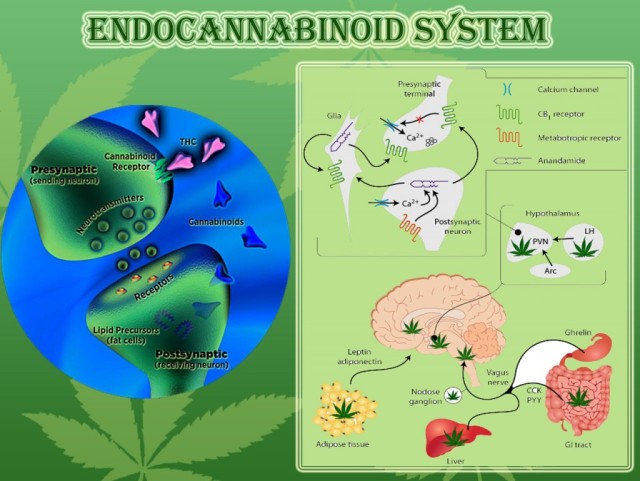
Among the many amazing parts of our brain that handle various tasks, there lies a place reserved to take on the effects of the chemical tetrahydrocannabinol, or what most refer to as, THC. When we smoke, eat or consume parts of the cannabis plant that contain THC, the chemical is released into our brains and transmitted throughout the rest of our bodies, causing all sorts of fun and colorful reactions, which add up to the high we have come to know and love. So far scientific studies have been able to discover the phenomenon of munchies and how our brains trick us into thinking we are hungry, similarly to how coffee tricks our brains into thinking we have energy or alcohol into thinking more creatively. THC reacts primarily with our brain’s natural endocannabiniod system, which helps to control emotions, memory, pain sensitivity and appetite. Though, for the sake of speaking in layman’s terms, I will refer to these parts of our brains as the cannabis receptors.
When the THC enters our system, dopamine, the neurotransmitter that makes us happy, is released into our brains. This is commonly experienced as a euphoric, calming sensation that makes us more relaxed, but, sometimes it can have the opposite effect. Have you ever been on a public outing whilst stoned out of your mind and felt like people just know you’re high? Like, they all know, and they’re judging you for it. Well, whether this is simply a reflection of one’s character or not, it is said that the cannabinoid system can distort the emotions’ relevance, which can lead to paranoia. Regardless of the fact that this side effect is associated with heavy marijuana use, it is more likely that one would become paranoid in a situation where they felt self-conscious or vulnerable, rather than in direct correlation with how much THC is in their system.
As for how THC can affect the memory, studies have shown that smoking at an adolescent age can alter the growth of the frontal lobe, a major area of the brain’s memory functions, before it can fully develop. This, in turn, might be a factor worth considering if you’re wondering what age is appropriate to begin smoking weed. “Our results suggest that early-onset substance use may alter the development of white matter circuits, especially those connections among the frontal, parietal and temporal regions of the brain,” said study leader Manzar Ashtari. It is estimated that on average, the human brain does not reach full maturity until at least the mid-20s.
I can only imagine what kinds of interesting research will develop involving weed on the human brain. I predict this will be made available to us with its coming legalization in the near future, but for now we can simply be left in awe by the already incredible things that happen to our minds and bodies when we toke. Whether we use it to medicate, celebrate, expand our minds or just as a recreational pleasure, cannabis is an intriguing plant and never ceases to amaze me with its many mysteries yet to be discovered.









